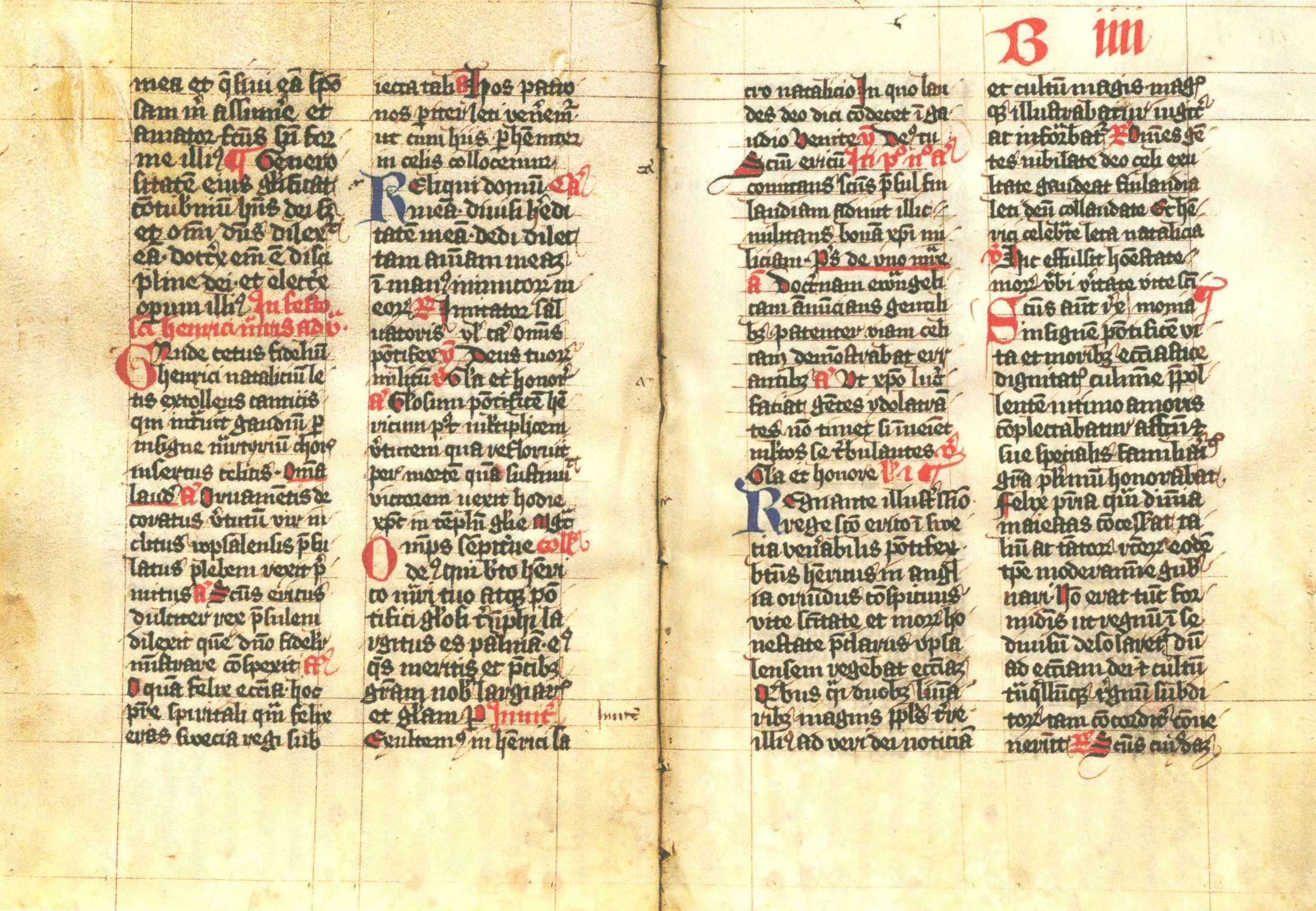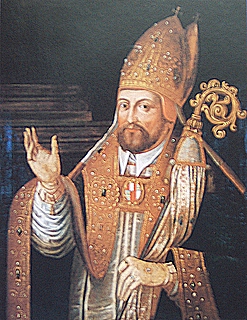|
Melchior Von Meckau
Melchior von Meckau (1440–1509) (called the Cardinal of Brixen) was a German Roman Catholic cardinal and bishop. Life and church Melchior von Meckau was born in Meissen in 1440, the son of Gaspar von Meckau, who later became a counselor of Maximilian I, Holy Roman Emperor. He began his studies at Leipzig in 1458, and then enrolled at the University of Bologna in 1459. He ultimately received a doctorate in law from the University of Bologna. He became provost of the Cathedral of Magdeburg in 1470. He moved to Rome and became a secretary in the Chancery of Apostolic Briefs. In 1473, Pope Sixtus IV nominated him to be dean of the cathedral chapter of Meissen Cathedral. From 1473, he was also a counselor of Sigismund, Archduke of Austria, becoming his chancellor in 1481. He was also a canon of Brixen Cathedral. On April 20, 1482, he was named coadjutor bishop of Georg Gosler, Prince-Bishop of Brixen. He spent most of his time with Archduke Sigismund in Innsbruck until ... [...More Info...] [...Related Items...] OR: [Wikipedia] [Google] [Baidu] |
Cathedral Chapter
According to both Catholic and Anglican canon law, a cathedral chapter is a college of clerics ( chapter) formed to advise a bishop and, in the case of a vacancy of the episcopal see in some countries, to govern the diocese during the vacancy. In the Catholic Church their creation is the purview of the Pope. They can be ''numbered'', in which case they are provided with a fixed prebend, or ''unnumbered'', in which case the bishop indicates the number of canons according to the ability of diocesan revenues to support them. These chapters are made up of canons and other officers, while in the Church of England chapters now include a number of lay appointees. In some Church of England cathedrals there are two such bodies, the lesser and greater chapters, which have different functions. The smaller body usually consists of the residentiary members and is included in the larger one. Originally, the term "chapter" referred to a section of a monastic rule that was read out daily dur ... [...More Info...] [...Related Items...] OR: [Wikipedia] [Google] [Baidu] |
Missal
A missal is a liturgical book containing instructions and texts necessary for the celebration of Mass throughout the liturgical year. Versions differ across liturgical tradition, period, and purpose, with some missals intended to enable a priest to celebrate Mass publicly and others for private and lay use. The texts of the most common Eucharistic liturgy in the world, the Catholic Church's Mass of Paul VI of the Roman Rite, are contained in the 1970 edition of the Roman Missal. Missals have also been published for earlier forms of the Roman Rite and other Latin liturgical rites. Other liturgical books typically contain the Eucharistic liturgies of other ritual traditions, but missals exist for the Byzantine Rites, Eastern Orthodox Western Rites, Lutheran and Anglican liturgies. History Before the compilation of such books, several books were used when celebrating Mass. These included the gradual (texts mainly from the Psalms, with musical notes added), the evangelary or g ... [...More Info...] [...Related Items...] OR: [Wikipedia] [Google] [Baidu] |
Breviary
A breviary () is a liturgical book used in Christianity for praying the canonical hours, usually recited at seven fixed prayer times. Historically, different breviaries were used in the various parts of Christendom, such as Aberdeen Breviary, Belleville Breviary, Stowe Breviary and Isabella Breviary, although eventually the Roman Breviary became the standard within the Roman Catholic Church (though it was later supplanted with the Liturgy of the Hours); in other Christian denominations such as the Lutheran Churches, different breviaries continue to be used, such as The Brotherhood Prayer Book. Different breviaries The "contents of the breviary, in their essential parts, are derived from the early ages of Christianity", consisting of psalms, Scripture lessons, writings of the Church Fathers, as well as hymns and prayers. From the time of the early Church, the practice of seven fixed prayer times, being attached to , have been taught; in '' Apostolic Tradition ... [...More Info...] [...Related Items...] OR: [Wikipedia] [Google] [Baidu] |
Synod
A synod () is a council of a Christian denomination, usually convened to decide an issue of doctrine, administration or application. The word '' synod'' comes from the Ancient Greek () ; the term is analogous with the Latin word . Originally, synods were meetings of bishops, and the word is still used in that sense in Catholicism, Oriental Orthodoxy and Eastern Orthodoxy. In modern usage, the word often refers to the governing body of a particular church, whether its members are meeting or not. It is also sometimes used to refer to a church that is governed by a synod. Sometimes the phrase "general synod" or "general council" refers to an ecumenical council. The word ''synod'' also refers to the standing council of high-ranking bishops governing some of the autocephalous Eastern Orthodox and Oriental Orthodox churches. Similarly, the day-to-day governance of patriarchal and major archiepiscopal Eastern Catholic Churches is entrusted to a permanent synod. Usages in diffe ... [...More Info...] [...Related Items...] OR: [Wikipedia] [Google] [Baidu] |
Innsbruck
Innsbruck (; ) is the capital of Tyrol (federal state), Tyrol and the List of cities and towns in Austria, fifth-largest city in Austria. On the Inn (river), River Inn, at its junction with the Wipptal, Wipp Valley, which provides access to the Brenner Pass to the south, it had a population of 132,493 in 2018. In the broad valley between high mountains, the so-called North Chain in the Karwendel Alps (Hafelekarspitze, ) to the north and Patscherkofel () and Serles () to the south, Innsbruck is an internationally renowned winter sports centre; it hosted the 1964 Winter Olympics, 1964 and 1976 Winter Olympics as well as the 1984 Winter Paralympics, 1984 and 1988 Winter Paralympics. It also hosted the first 2012 Winter Youth Olympics, Winter Youth Olympics in 2012 and is going to host the 2027 Winter Deaflympics. The name means "bridge over the Inn". History Antiquity The earliest traces suggest initial inhabitation in the early Stone Age. Surviving Ancient Rome, pre-Roman pla ... [...More Info...] [...Related Items...] OR: [Wikipedia] [Google] [Baidu] |
Bishopric Of Brixen
The Prince-Bishopric of Brixen () was an ecclesiastical principality of the Holy Roman Empire in the present-day northern Italian province of South Tyrol. It should not be confused with the larger Catholic diocese, over which the prince-bishops exercised only the ecclesiastical authority of an ordinary bishop. The bishopric in the Eisack/Isarco valley was established in the 6th century and gradually received more secular powers. It gained imperial immediacy in 1027 and remained an Imperial Estate until 1803, when it was secularised to Tyrol. The diocese, however, existed until 1964, and is now part of the Diocese of Bolzano-Brixen. History The Diocese of Brixen is the continuation of that of Säben Abbey near Klausen, which, according to legend, was founded about 350 as ''Sabiona'' by Saint Cassian of Imola. As early as the 3rd century, Christianity had penetrated Sabiona, at that time a Roman custom station of considerable commercial importance. It may have been a retrea ... [...More Info...] [...Related Items...] OR: [Wikipedia] [Google] [Baidu] |
Prince-Bishop
A prince-bishop is a bishop who is also the civil ruler of some secular principality and sovereignty, as opposed to '' Prince of the Church'' itself, a title associated with cardinals. Since 1951, the sole extant prince-bishop has been the Bishop of Urgell, Catalonia, who has remained ''ex officio'' one of two co-princes of Andorra, along with the French president. Overview In the West, with the decline of imperial power from the 4th century onwards in the face of the barbarian invasions, sometimes Christian bishops of cities took the place of the Roman commander, made secular decisions for the city and led their own troops when necessary. Later relations between a prince-bishop and the burghers were invariably not cordial. As cities demanded charters from emperors, kings, or their prince-bishops and declared themselves independent of the secular territorial magnates, friction intensified between burghers and bishops. The principality or prince-bishopric (Hochstift) r ... [...More Info...] [...Related Items...] OR: [Wikipedia] [Google] [Baidu] |
Georg Gosler
{{disambiguation ...
Georg may refer to: * ''Georg'' (film), 1997 *Georg (musical), Estonian musical * Georg (given name) * Georg (surname) * , a Kriegsmarine coastal tanker * Spiders Georg, an Internet meme See also * George (other) George may refer to: Names * George (given name) * George (surname) People * George (singer), American-Canadian singer George Nozuka, known by the mononym George * George Papagheorghe, also known as Jorge / GEØRGE * George, stage name of Gior ... [...More Info...] [...Related Items...] OR: [Wikipedia] [Google] [Baidu] |
Coadjutor Bishop
A coadjutor bishop (or bishop coadjutor) ("co-assister" in Latin) is a bishop in the Latin Catholic, Anglican and (historically) Eastern Orthodox churches whose main role is to assist the diocesan bishop in administering the diocese. The coadjutor automatically succeeds the diocesan bishop when he retires, dies or leaves office for another reason. In the Latin Catholic Church, the coadjutor is a priest or bishop appointed by the pope in Rome. He is considered the principal deputy administrator of the diocese. In the Eastern Catholic churches, the adjutor may be appointed by the pope or by the church itself. Within the Anglican Communion, a diocesan committee appoints the coadjutor, who can be male or female. Latin Church Role of coadjutor In the Latin Church, the pope appoints a coadjutor to help the bishop govern the diocese. A bishop himself, the coadjutor can substitute for the diocesan bishop in his absence (Canon 403§3).The coadjutor must be a Catholic priest ( ... [...More Info...] [...Related Items...] OR: [Wikipedia] [Google] [Baidu] |
Brixen
Brixen (; , ; or , ) is a town and communes of Italy, commune in South Tyrol, northern Italy, located about north of Bolzano. Geography Brixen is the third-largest city and oldest town in the province, with a population of nearly twenty-three thousand. It is located at the confluence of the Eisack and Rienz rivers, and today it is the capital of the Eisack district community. The Brenner Pass, on the Italian-Austrian border, is 45 km to the north of Brixen, and Bolzano lies 40 km to the south. To the east lies the Plose mountain massif with three peaks, the closest of which being the Telegraph peak (Monte Telegrafo) (2,486 m), formally known as Fröllspitze. On the western side, there is the Königsangerspitze mountain (Monte Pascolo) (2,439 m) and the Pfeffersberg slope (Monteponente), both of which are located within the Sarntal Alps. Brixen is especially known for its skiing, with a major skiing, ski resortthe Plose ''Frazioni'' Brixen is made up of about 22 small ... [...More Info...] [...Related Items...] OR: [Wikipedia] [Google] [Baidu] |
Canon (priest)
Canon () is a Christian title usually used to refer to a member of certain bodies in subject to an ecclesiastical rule. Originally, a canon was a cleric living with others in a clergy house or, later, in one of the houses within the precinct of or close to a cathedral or other major church and conducting his life according to the customary discipline or rules of the church. This way of life grew common (and is first documented) in the 8th century AD. In the 11th century, some churches required clergy thus living together to adopt the rule first proposed by Saint Augustine that they renounce private wealth. Those who embraced this change were known as Augustinians or Canons Regular, whilst those who did not were known as secular canons. Secular canons Latin Church In the Latin Church, canons are the members of a chapter, that is a body of senior clergy overseeing either a cathedral (a cathedral chapter) or a collegiate church. Depending on the title of the church, several lan ... [...More Info...] [...Related Items...] OR: [Wikipedia] [Google] [Baidu] |







